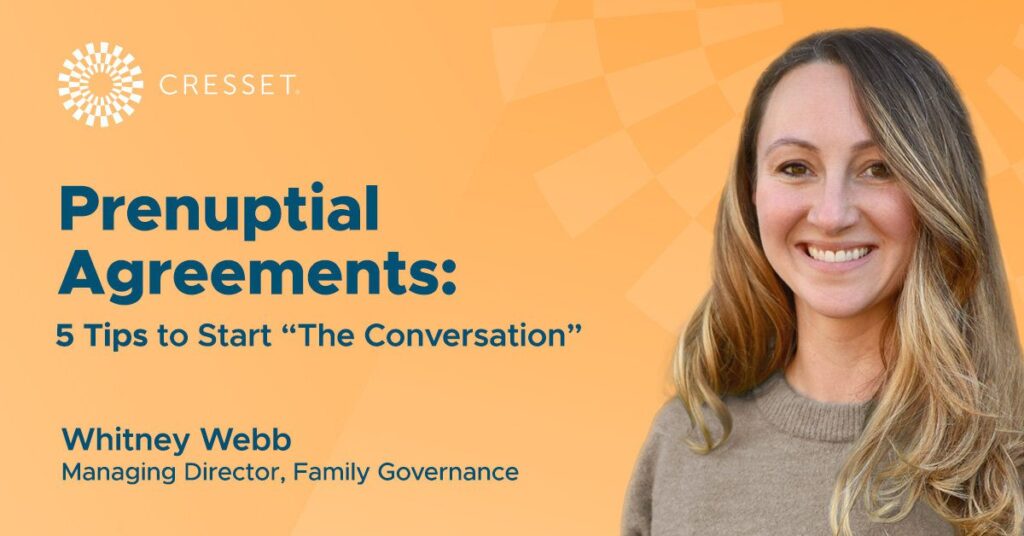
A prenuptial agreement (prenup) is meant to determine what happens if a marriage ends in divorce, ideally to the satisfaction of both spouses. Many people frame it as “buying an insurance policy” – you don’t plan or hope for a fire, but you are protected against one if it happens. When love is in the air while planning a wedding, it can feel awkward (or downright difficult) to broach the prenup conversation, as it can surface power dynamics, insecurities, and defensiveness in a way a traditional insurance policy does not.
However, prenups can be incredibly important for families with muti-generational wealth, those with operating businesses, or anyone wanting to take some uncertainty out of future custody arrangements. If a prenup is deemed necessary, it’s important that those conversations come from a place of empathy, tact, and even a bit of humor. Below are five tips to begin the prenup conversation on the right foot.
- Lead with positive intent. Prenups can be requested by one or both soon-to-be spouses, or they can be the idea (or mandate) of parents or grandparents. Either way, the parties pushing for the prenup should be clear about the mutually beneficial outcome they are planning (hoping) for, not any fear that might be driving the decision. For example, a matriarch who is encouraging her daughter and future son-in-law could speak to her hopes of the family wealth benefiting her great grandchildren and beyond. To help ensure this comes to fruition, she is requesting (or mandating in trust documents) prenups for all family members as a risk-mitigating strategy. Ideally, these requests or mandates are shared before her daughter is even in a serious relationship.
- Ensure the person marrying into the family keeps his or her dignity. Defensiveness can arise during conversations about prenups, as it is inherently putting up protections against someone you love. This can lead a fiancé to react with anger that they are seen as a “gold-digger” and even push them to throw their hands up and walk away from negotiating, or worse the marriage itself. Find ways to allow everyone to be heard, respected, and feel in control. Consider compromises to give them a say in the process and find ways to assure them they are viewed as an equal partner – not a greedy future spouse.
- Frame the process as a foundational step in a hopefully long marriage. I have had many clients who go through the prenup conversations and process having learned a great deal about their future spouse’s hopes, priorities, and values. That is invaluable in starting a life together. Marriage includes a lifetime of tough conversations and uncomfortable decisions. Viewing the experience as a learning opportunity and a springboard for building a fruitful life together can make all the difference in how a couple approaches the process. Prenups sometimes include a short intro paragraph (non-binding) written by the couple stating their hopes for the agreement and for their marriage, which is a wonderful way to begin.
- Keep the next generation in mind. Many families have formal strategies in place to help ensure muti-generational wealth. That means that the children and grandchildren of the marrying couple will likely one day face the same potentially awkward conversations about prenups. It’s important for the couple to consider what precedents to set to make the experience easier on their kids or future children. Approach the process with love, intentionality, and even humor to make the process simpler and lighter for the next generation. I’ve seen this include everything from a running document of lessons learned to cringeworthy advice from attorneys to prenup celebration dinners.
- Constantly ask if a decision is in the best interest of the couple. Many people believe that finding the right partner and maintaining a happy marriage is at the core of a life well lived. However, I still see partners, or their families, haggling on terms and bringing in “bulldozer” lawyers to negotiate prenup contracts. Before you allow that to happen, ask yourself, “Is potentially protecting X amount more money worth any amount of harm to this relationship?” Love and trust are inextricably linked to how we share our resources. Consider how all parts of the prenup process might affect the relationship and make decisions accordingly.
If you would like to discuss your family wealth planning needs, please reach out and we would be happy to schedule a call.
About Cresset
Cresset is an independent, award-winning multi-family office and private investment firm with more than $237 billion in assets under management and advisement (as of 1/1/26). Cresset serves the unique needs of entrepreneurs, CEO founders, wealth creators, executives, and partners, as well as high-net-worth and multi-generational families. Our goal is to deliver a new paradigm for wealth management, giving you time to pursue what matters to you most.
https://cressetcapital.com/disclosures/
